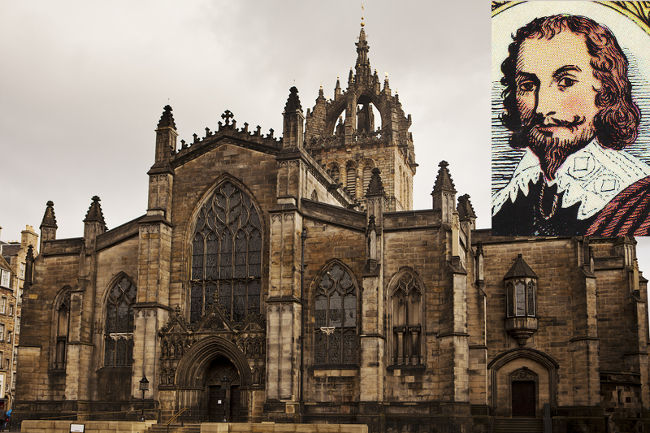Banished to Inverness! What a shock it must have been to the Reverend Robert Bruce. He had offended King James VI. Although Bruce was loyal to the King, always dignified and courtly to him, yet he never forgot that he was Christ's servant as well as a subject of James. But the King was offended – punishment must fall upon this popular preacher of the Gospel.
So Robert Bruce was sentenced to banishment – to Inverness. On 27th February 1605 he was removed from his church of St. Giles, Edinburgh, and banned from preaching. On 18th August, the authorities gave him ten days to move to Inverness. He remained here in our city for seven years. Mary Queen of Scots had come north only a few years before and described the journey “as terrible for man and beast”. King James VI had also come north, and found the land was full of “bloodshed, rapine, and the burning of homesteads and hayricks, and every sort of lawlessness prevailed”.
Inverness in 1605 was a very different place from what we know today. It was described at the time as “a small town, made up of two intercepting streets, huddled under the shadow of a castle. A bridge of oak spanned the river Ness on the left bank of which was springing up a modest little suburb; there were few comforts of life to be found in the remote region.”
At least one attempt was made on Bruce's life in Inverness but he was given permission to preach. This exile lasted until 1613 when the King granted parole, on condition he did not enter Edinburgh; this allowed Bruce back to his home just outside Edinburgh.
Bruce, however, still on parole, entered Edinburgh in 1622, to see about the organisation of his son's wedding and some other business which followed the death of his wife. So on the 18th April 1622 the King exiled him back to Inverness. The journey took them round by Turriff and it was there that he prayed and“appeared afterwards very quiet”. On being asked why he was quiet, he responded, “I was receiving my commission from my Master, Jesus, to go to Inverness … I go to sow a seed in Inverness that shall not be rooted out for many ages”.
In Inverness persecution soon arose, resulting in Bruce being put out of his lodgings and forced to move to Channory. But the persecution died quickly away and the people welcomed him back to the town. He began preaching, each Sunday, and midweek with a meeting for prayer and worship every evening. At these meetings large numbers of local people attended, with clansmen and their chiefs travelling into Inverness, from all the points of the compass, to hear Bruce preach.
A deputy sent north on business reported, “Multitudes crossed the ferries to hear him.” They came, he records,“from Ross and Sutherland, and the Lord blessed his labours to the conversion of many”. Another reported, “They crossed over ferries and bridgeless rivers to hear him.” Inverness must have been glorious with the very presence of God.
Robert Bruce learned to speak in the Gaelic language so he could bring to many more the gospel in their native tongue. One hearer described his preaching as “a fresh message of hope” and another reported that it was“a message of pardon and peace.”
Is this “message of hope” not something that applies to you and me just as much as back in 1622?
What hope is this? – the“hope of eternal life, which God, that cannot lie, promised before the world began.” (Titus 1 v 2)
Hope based on what? –“Looking for that blessed hope, and the glorious appearing of the great God and our Saviour Jesus Christ; Who gave himself for us, that he might redeem us from all iniquity.” (Titus 2 v 13–14)
Can I not do this for myself by living a good and useful life? – “Not by works of righteousness which we have done, but according to his mercy he saved us.” (Titus 3 v 5)
Let us learn today the lessons that Robert Bruce taught our ancestors here in Inverness. Let us learn of that true“hope” which leads to“pardon and peace” within the soul.
